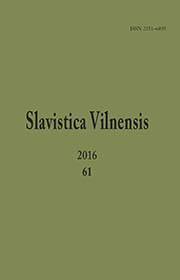К вопросу о формировании польскиx говоров в Литве: полемика вокруг Г. Турской
On the Issue of the Formation of Polish Dialects in Lithuania: the Discussion Around H. Turska
Author(s): Viktorija UšinskienėSubject(s): Modern Age, Historical Linguistics, Sociolinguistics, Western Slavic Languages, Baltic Languages, Philology
Published by: Vilniaus Universiteto Leidykla
Keywords: Polish dialects in Lithuania; Northern Kresy dialect; Polish culture of GDL;
Summary/Abstract: One of the most controversial problems in Polish historical dialectology is the ques¬tion of the genesis of the Polish language in the North-East Borderland of Poland, i.e., the variety of the Polish language which has developed in the former territory of the Grand Duchy of Lithuania (GDL). Some important aspects of the evolution of this language – first of all – its dialectical substrate and the chronology of the development of its different variants, have still not received an unambiguous interpretation, and this has inspired fur¬ther scientific research. The article deals with the systematization of the main approaches to the chronology of the formation of Polish dialects in Lithuania. It includes a system¬ic survey of the concepts made by important researchers of the Polish language of the borderland, such as K. Nitsch, H. Turska, J. Rieger, I. Grek-Pabisowa, I. Maryniakowa, V. Chekmonas and others. Historical circumstances in the GDL created a special relationship between the local Polish subdialects and the standard (cultural) dialect. Within the conditions of the autoch¬thonic development of the language, its official sub-system is formed on the basis of the dialects, while we can observe the reverse process in Lithuania, as the Polish standard dialect was formed there much earlier than the rural dialects. The areas of the Polish rural subdialects had been formed in the GDL around the second half of the 19th century as a result of the gradual polonization of the Lithuanian and Belarusian countryside. The at¬tempts of several scholars to shift the time of their formation to an earlier period of time, namely to the 16th-18th centuries, seem to be insufficiently convincing.
Journal: Slavistica Vilnensis
- Issue Year: 61/2016
- Issue No: -
- Page Range: 63-80
- Page Count: 18
- Language: Russian

